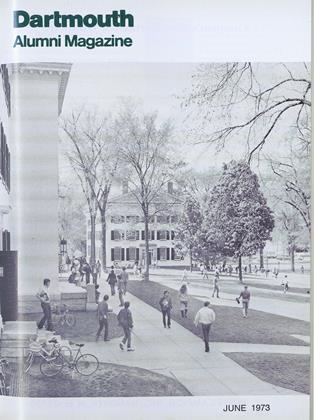By Peter Bien (Professor of English and Chairman of the Comparative Literature Program).Princeton University Press., 1972. 255 pp. $9.MODERN GREEK WRITERS. Edited by PeterBien and Edmund Keeley. Princeton UniversityPress, 1972. 261 pp. $10.
Specialists in modern Greek culture do not need to read this review. They no doubt belong to the Modern Greek Studies Association and attended the symposium at Princeton University in 1969 where the essays in Modern GreekWriters were originally presented as papers. If they heard Professor Bien read "The Demoticism of Kazantzakis," they would be familiar with the main point of Kazantzakis and the LinguisticRevolution in Greek Literature, a greatly expanded form of the essay. Specialists also know the quality to expect from Professor Bien's own research, his work with the association, and his editorial expertise. Both volumes testify to his clear, logical thinking and thorough scholarship.
For the non-specialist the best place to start is with one purpose of Modern Greek Writers: "to awaken English-speaking readers and educators to the creative wealth of modern Greece, a wealth that has been so unjustifiably neglected until now in our schools and in our humanistic studies at all levels."
This purpose was certainly fulfilled for me. Names of Greek authors became persons of distinction involved with Greek politics and European culture. The titles of some of the essays con- vey the range of topics: "Calvos in Geneva," by Bertrand Bouvier; "Matesis' Vassilikos: the First Drama of Ideas," by Angelos Terzakis; "The 'New' Poems of Cavafy," by Edmund Keeley; and "Elytis' Brecht and Hazidakis' Pirandello," by Stavros Deligiorgis.
Kazantzakis and the Linguistic Revolution inGreek literature was written with a twofold purpose: "(1) to give a sense of Kazantzakis" zealous involvement with demotic over the entire length of his active professional life, and (2) to provide the necessary background so that we may comprehend why demoticism arose and what forms it took." I was particularly interested in the complicated problems facing those seeking to unify the Greek people through one spoken and written language, but I was also fascinated by the life of Kazantzakis and his never wavering faith in demoticism however threatening to his welfare as both person and writer.
Both books are scholarly and informative, but perhaps their ultimate value will be inspirational I for one am inspired to read some modern Greek literature in translation or perhaps in the original with the help of Demotic Greek by Peter Bien, John Rassias, and Chrysanthi Bien.
A museum may have to spend a million dollars for one Greek vase, but we need spend only time to enjoy through our libraries "the creative wealth of modern Greece."
A Classical Greek scholar, author of The Art of Greek Comedy and The Novel and the Reader: A Primer for Critics, Miss Lever is Professor ofEnglish, Wellesley College.
 View Full Issue
View Full Issue
More From This Issue
-
 Feature
FeatureHow the Dutch Handle It
June 1973 By Robert D. Haslach '68 -
 Feature
FeatureTHE FIRST COED YEAR
June 1973 By Bruce Kimball '73 and Andrew Newman '74 -
 Feature
FeatureRETIRING FACULTY
June 1973 -
 Feature
FeatureClass Officers Weekend
June 1973 -
 Feature
FeatureAvalanche Authority
June 1973 -
 Feature
FeatureEditors' Editor
June 1973 By MARY ROSS
KATHERINE LEVER
-
 Books
BooksTHE ODYSSEY OF HOMER.
FEBRUARY 1968 By KATHERINE LEVER -
 Books
BooksPETER IN ROME. THE LITERARY, LITURGICAL, AND ARCHEOLOGICAL EVIDENCE.
JUNE 1969 By KATHERINE LEVER -
 Books
BooksAMERICAN WOMEN: A STORY Of SOCIAL CHANGE.
OCTOBER 1970 By Katherine Lever -
 Books
BooksDOMESTIC FABLES.
MAY 1972 By KATHERINE LEVER -
 Books
BooksTHE NOVELS OF JANE AUSTEN: AN INTERPRETATION.
March 1974 By KATHERINE LEVER -
 Books
BooksEURIPIDES: IPHIGENEIA IN TAURIS.
February 1975 By KATHERINE LEVER
Books
-
 Books
BooksWings
June 1980 By Everett Wood ’38 -
 Books
BooksSCRATCHY
May 1951 By HELEN GARRISON -
 Books
BooksNO PEACE BEYOND THE LINE: THE ENGLISH IN THE CARIBBEAN 1624-1690.
OCTOBER 1972 By JERE R. DANIELL II -
 Books
BooksBUCKS COUNTY: PHOTOGRAPHS OF EARLY ARCHITECTURE.
January 1975 By JOHN HURD '21 -
 Books
BooksThe New Right
November 1979 By Laurence I. Radway -
 Books
BooksTANSTAAFL: THE ECONOMIC STRATEGY FOR ENVIRONMENTAL CRISIS.
JULY 1971 By THOMAS B. ROOS

